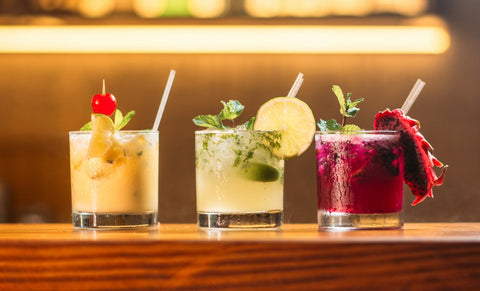Functional drinks are not just for hydration; they are infused with beneficial, often natural extracts, resulting in numerous health benefits. They taste good, help quench thirst, keep you hydrated, but they also have a range of health benefits. Of course, they are for regular use, so their potency is not very high, and their content of natural extract is generally quite low – after all, they are not meant to treat health conditions.
Unlike traditional beverages, they are specifically designed to serve various functions, such as improving digestion, enhancing focus, supporting immune health, or reducing stress. The market now includes everything from adaptogenic drinks for stress to CBD-infused beverages, with new formulations appearing frequently.
While some wellness drinks contain ingredients supported by scientific evidence, many rely on marketing language that can be misleading. Understanding what goes into these beverages—and how those components affect the body—is essential for making informed choices.
What Are Functional Beverages?

Functional beverages are drinks enhanced with bioactive compounds or nutrients intended to produce physiological benefits. These benefits may include improved mental clarity, digestive support, or better sleep regulation. What distinguishes these beverages from conventional drinks is the presence of added substances that claim to support health-related outcomes.
Common types of functional beverages include:
· Adaptogenic drinks for stress, which contain herbs such as ashwagandha or rhodiola that may support the body’s stress response.
· Probiotic drinks for digestion, which contain live microbial strains believed to promote gut health.
· CBD-infused beverages, formulated with cannabidiol to potentially support relaxation or anxiety reduction.
· Nootropic energy drinks, which include compounds intended to enhance cognitive function.
· Vitamin-enhanced waters, that are fortified with essential vitamins and minerals aimed at improving energy, immunity, or skin health.
These smart drink choices are not all equivalent in terms of efficacy or scientific backing. So, each of them should be evaluated based on its ingredients and how those ingredients interact with the body.
Ingredients That Show Evidence of Benefit
Several ingredients commonly found in wellness drinks have demonstrated physiological effects when consumed in appropriate doses.
Probiotics
Live strains of beneficial bacteria are often added to probiotic drinks for digestion. These microorganisms may help maintain a balanced gut microbiome, which plays a key role in immune function and nutrient absorption. Regular intake of probiotics has been linked to improvements in gastrointestinal function and may help reduce the frequency of digestive issues in some individuals (1).
Adaptogens
Adaptogens, such as ashwagandha and rhodiola, are added to adaptogenic drinks to help alleviate stress. These herbs are believed to help regulate cortisol levels and support resilience to physical and emotional stress. Ashwagandha, in particular, has shown promise in modulating stress responses and enhancing sleep quality (2).
L-theanine
This amino acid is naturally found in green tea and is included in some nootropic energy drinks. It promotes relaxation without sedation and may reduce the overstimulating effects of caffeine. When used together, caffeine and L-theanine have been shown to support alertness while reducing jitteriness (3).
Magnesium
It is one of the most abundant minerals in the body, participating in many enzymatic pathways. Magnesium is included in many sleep support beverages due to its role in regulating the nervous system and promoting muscle relaxation. Adequate magnesium intake has been linked to improved sleep quality and reduced anxiety levels. It also plays a role in energy metabolism and electrolyte balance (4).
Electrolytes
Electrolyte hydration drinks contain minerals such as sodium, potassium, calcium, and magnesium. These help maintain fluid balance, especially after physical activity or during periods of high heat. Replacing lost electrolytes can support energy levels and prevent dehydration-related symptoms such as muscle cramps and fatigue.
Assessing Popular Functional Beverage Categories
A closer evaluation of widely available functional beverages reveals both potential benefits and limitations. Some options are well-formulated, while others may include unnecessary additives or ineffective doses.
Kombucha
Kombucha is a fermented tea that contains live cultures and organic acids. It is a source of probiotics and may benefit gut health. However, commercial products vary significantly in sugar content and microbial activity. Consumers should opt for low-sugar varieties and look for active cultures listed on the label (5).
CBD-Infused Beverages
CBD-infused beverages contain cannabidiol derived from hemp. These drinks are promoted for anxiety relief, pain management, and sleep support. Although some evidence suggests CBD may influence the endocannabinoid system, reliable human studies remain limited. Additionally, the effectiveness of CBD depends on the dosage and bioavailability, which can vary across brands (6).
Collagen Waters
Collagen drinks for skin are designed to support skin elasticity, joint health, and connective tissue. Collagen peptides may be more effective when hydrolyzed for improved absorption. However, results vary depending on the dosage and whether the product also includes co-factors, such as vitamin C, which aids in collagen synthesis (7).
Nootropic Energy Drinks
These beverages aim to enhance memory, attention, and mental clarity by combining compounds such as caffeine, L-theanine, and B vitamins. While they may offer short-term cognitive enhancement, excessive caffeine can lead to overstimulation, irritability, and disrupted sleep. Consumers should be mindful of total stimulant content.
Sleep Support Beverages
Some drinks are formulated with magnesium, melatonin, or valerian root to support sleep onset and quality. These sleep support beverages may be effective when taken occasionally and at appropriate times. However, habitual use of melatonin or sedative herbs should be monitored to avoid dependency or altered sleep cycles.
The Bottom Line: Making Informed Choices
The growing popularity of functional beverages reflects a shift toward more personalized nutrition and lifestyle support. When chosen carefully, these wellness drinks can serve as useful tools for specific health goals such as improved digestion, reduced stress, or better sleep.
However, not every beverage delivers meaningful benefits. Many contain added sugars, artificial flavors, or underdosed active ingredients. Consumers should:
· Read ingredient labels thoroughly.
· Select products with clear dosing and minimal additives.
· Align beverage choices with personal health needs and dietary context.
Used thoughtfully, smart drink choices such as adaptogenic drinks for stress, probiotic drinks for digestion, or electrolyte hydration drinks can support health and well-being. However, they should complement—not replace—a balanced diet and healthy lifestyle. Understanding what’s inside your beverage is the first step toward making functional choices that truly matter.
References
1. Gul S, Durante-Mangoni E. Unraveling the Puzzle: Health Benefits of Probiotics-A Comprehensive Review. J Clin Med. 2024 Mar 1;13(5):1436.
2. Panossian A, Wikman G. Effects of Adaptogens on the Central Nervous System and the Molecular Mechanisms Associated with Their Stress—Protective Activity. Pharmaceuticals (Basel). 2010 Jan 19;3(1):188–224.
3. Baba Y, Inagaki S, Nakagawa S, Kaneko T, Kobayashi M, Takihara T. Effects of l-Theanine on Cognitive Function in Middle-Aged and Older Subjects: A Randomized Placebo-Controlled Study. J Med Food. 2021 Apr 1;24(4):333–41.
4. Boyle NB, Lawton C, Dye L. The Effects of Magnesium Supplementation on Subjective Anxiety and Stress-A Systematic Review. Nutrients. 2017 Apr 26;9(5):429.
5. Selvaraj S, Gurumurthy K. An overview of probiotic health booster-kombucha tea. Chin Herb Med. 2022 Dec 16;15(1):27–32.
6. Meissner H, Cascella M. Cannabidiol (CBD) in Clinical Care. In: StatPearls [Internet]. Treasure Island (FL): StatPearls Publishing; 2025 [cited 2025 Jul 28]. Available from: http://www.ncbi.nlm.nih.gov/books/NBK556048/
7. MD PP, MD MMS. Harvard Health. 2023 [cited 2025 Jul 28]. Considering collagen drinks and supplements? Available from: https://www.health.harvard.edu/blog/considering-collagen-drinks-and-supplements-202304122911


